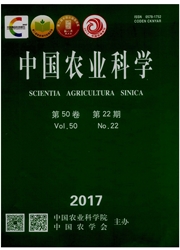

 中文摘要:
中文摘要:
【目的】探讨急性热应激条件下肉鸡组织的病理性损伤及其Hsp90含量变化的相关性。【方法】将100只1日龄AA肉鸡随机分成5组,每组20羽。正常环境温度下对受试鸡进行30d的适应性饲养后,除对照组外,将其余80只受试鸡的环境温度迅速由(25±1)℃上升至(40±1)℃,并分别持续进行2、3、5和10h的热应激处理。利用组织病理、免疫组织化学和酶联免疫吸附试验,检测急性热应激状态下受试肉鸡心脏、肝脏及肾脏组织的病理性损伤和Hsp90的定位与表达。【结果】在热应激开始的2~5h,受试鸡心脏、肝脏和肾脏组织的实质细胞损伤表现出随热应激时间的持续而逐渐加重的趋势,病理变化特征以颗粒变性和水泡变性为主。热应激2h后,Hsp90在肉鸡心脏、肝脏、肾脏组织中的表达量呈极显著增加(P〈0.01),而在应激持续到3~5h时呈现下降趋势,待热应激持续至10h后,心脏和肾脏组织中Hsp90的表达量又逐渐上升。【结论】热应激状态下肉鸡组织细胞的应激性病理损伤与Hsp90的分布和含量存在一定程度的关联。Hsp90含量随热应激时间延长而出现先升高、然后下降并逐渐回升的波动,与同期各组织细胞所呈现的病理损伤变化相吻合,表明在热应激初期促使Hsp90表达量增加,以增强细胞在不利环境中的生存能力。
 英文摘要:
英文摘要:
[ Objective ] To study the relationship between tissue pathological injuries and the variations of Hsp90 concentration in the tissues of acute heat stressed broilers. [ Method ] One hundred AA broilers were divided into 5 groups randomly and 20 broilers per group. After 30 days adaptive feeding under the normal condition, 80 broilers were stressed by suddenly increasing environment temperature from (25 0: 1)℃ to (40 ~ 1)℃ for 2, 3, 5, 10 h, respectively. By means of histopathology, immunohistochemistry and enzyme linked immunosorbent assay (ELISA), the tissue pathological injuries and the distribution and expression of Hsp90 in the heart, liver and kidney of acute stressed broilers were studied.[ Result ]In the period of 2-5 h after heat stressing, the parenchymal cell damage of the heart, liver and kidney of the broiler chickens gradually aggravated with stress prolonging, and the typical histopathological changes were granular and vacuolar degeneration. In the heart, liver and kidney of heat stressed broilers, the expressions of Hsp90 showed the variable (P〈0.01) characterized by induction at 2 h heat stressing, reduction at 3 and 5 h heat stressing, and induction again at 10 h heat stressing. [Conclusion] There should be certain degree of correlation between the expression of Hsp90 and the histologic lesions of the heart, liver and kidney of the broiler chickens under stress state. As heat stress prolonged, the variable properties of Hsp90 concentration seemed to correspond with the tissue injuries the detected organs at the same period. It implied that heat stress can stimulate Hsp90 expression to strengthen cell survivability in disadvantageous environment at initial period of stress.
 同期刊论文项目
同期刊论文项目
 同项目期刊论文
同项目期刊论文
 Localization of Heat Shock Proteins and Histopathological Changes in the Kidneys of Transported Pigs
Localization of Heat Shock Proteins and Histopathological Changes in the Kidneys of Transported Pigs 期刊信息
期刊信息
